
This blog post is now outdated. The AI Copilot concept was replaced by Shopware AI in June 2025 and has since been expanded with additional features. You can learn more about the new concept on this page.
Artificial intelligence (AI) is already part of everyday life for many – does this also apply to your online business? With AI at their disposal, merchants can swiftly tackle diverse tasks, operate efficiently, and empower their business with enhanced speed and capability. You too can seize this opportunity, hand in hand with Shopware. Learn more about our 12 features infused with the incredible potential of AI, poised to revolutionize your everyday ecommerce experience. As an integral part of our AI Copilot, these features are designed to assist you in various aspects of Shopware, providing invaluable support along the way!
We will now take a closer look at the details and advantages of each feature. To do this, we have consulted experts in the field and conducted interviews with Shopware's product owners.
Content
Feature 1: AI-generated content for Shopping Experiences

Marie, please sum up in a sentence what this feature can do.
Marie: The AI Copilot | content for Shopping Experiences can help create different types of text content, check the text for spelling mistakes, and translate it into any language you choose.
And how does the feature work?
Marie: You can use the feature within the Shopping Experiences. When you’re editing or creating a page, you can quickly access the AI feature by pressing the space bar. Then all you have to do is input a prompt such as “Write a blog post about the weather in Italy” – and the artificial intelligence begins generating the text. Select the generated text to carry out different actions – for example to translate it or correct the grammar.

What are the biggest advantages of the new feature?
Marie: Copywriting requires a lot of manual work, specialist knowledge, and skill. This feature helps merchants overcome their writer’s block by getting the AI Copilot to come up with an initial draft. The feature can also help improve the overall quality of the text and eliminate the need for so many revision cycles.
Thanks for the insights, Marie!
Feature 2: AI export assistant

Tim, sum up in a sentence what the AI export assistant can do. I’m guessing it assists with exports?
Tim: Exactly. With the AI Copilot | export assistant you can now export specific data from Shopware in a CSV file – there you go, one sentence!
How does it work?
Tim: Firstly, you can activate the AI-based export assistant (in admin, go to Export > Settings). The user interface then immediately shows you the text box for your request. An example here could be: “Give me all yesterday’s orders.” With the aid of artificial intelligence, we convert the request into a database query and show you the result in a preview window. You can then download the results as a CSV file.
I’d like to make clear that we don’t, at any point, pass on any store data to the AI services – we only use artificial intelligence to create the database query.
We’re going to keep expanding this feature in future. So at the moment, not all requests are possible. That’s why we’d love to hear your feedback.
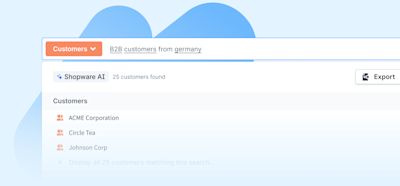
How does this feature help merchants? What’s the biggest advantage?
Tim: With a standard export, your only option is to export a complete data profile. With the AI export assistant, we give merchants the option of filtering the required data directly and only receiving the data they need.
Data from Shopware has a range of valuable and important purposes. It can be used, for example, to optimize business processes, for data analysis, and to make data-based decisions. And CSV files are a standardized format, so the data can be utilized in a number of applications and tools.
Thank you, Tim!
Feature 3: AI-based customer classification

Stefan, sum up in a sentence what this feature can do.
Stefan: The AI Copilot | customer classification generates labels based on the customers’ order history, and these labels can then be used as tags, for example for marketing mailings.
And now in a little more detail – how does it work?
Stefan: Merchants can specify a selection of customers whose data they want to use for customer clustering. An AI service searches the selected customers’ order information for common characteristics or behavior so that the selection can be divided into useful segments. To do this, the AI creates descriptive labels and rules. For example, you could have a label like “Frequent orderer” and the rules might be: “Customers who have placed at least 10 orders in the last three months”. In the next step, the new clusters and rules are applied to the customers, classifying them and assigning them appropriate tags. There may also be customers who aren’t assigned to any particular class.
Merchants can use the new tags in different areas of Shopware – for example to offer all customers with the tag “Bargain hunter” a newsletter highlighting offers of the week.
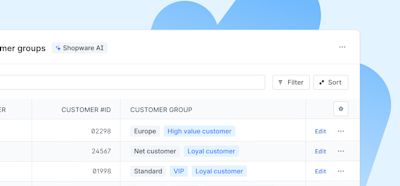
What do you see as the biggest bonus for merchants here?
Stefan: If a merchant wants to send a marketing mailing to a specific group of customers, for example, the order data needs to be clustered so that the relevant customers can be identified. The AI services help the merchant to create this cluster and suggest naming and selection rules. That saves huge amounts of time. The tags can also be used to produce rules and processes to enable further automation (with Rule Builder and Flow Builder).
Thanks, Stefan!
Feature 4: Image keyword assistant

Holger, please tell us in a sentence what this feature can do.
Holger: The AI Copilot | image keyword assistant analyzes uploaded images and assigns relevant keywords to them.
And now in a little more detail – how does it work?
Holger: When a user chooses this feature, uploaded images are analyzed using AI. The artificial intelligence identifies the content of the image and assigns keywords. These keywords are saved as image metadata and can be found, for example, via an admin search.

To what extent does the feature solve typical problems that merchants face?
Holger: Say, for example, you are designing a page and want to search for appropriate images. With very large databases, it helps users if they can locate relevant images in the media library using the keywords in the admin. The assigned keywords can also be saved as alt tags for better visibility to search engines.
That sounds great. Thank you, Holger!
Feature 5: AI-generated product review summary

Christian, please sum up in a sentence what this feature can do.
Christian: The AI Copilot | product review summary gives merchants an AI-generated summary of all the reviews for a product, and the merchants can publish it on the product details page, so customers have a clear overview of feedback on the product they are interested in without having to read every single product review.
And how does the AI feature work?
Christian: As ever, the merchants will find a reviews section in the admin for each product. The new feature allows them to create an AI-generated summary of the product reviews here. Once the AI has created a summary of the reviews, the merchant can check and adapt it. They can then save it and upload it to the product details page in the storefront.
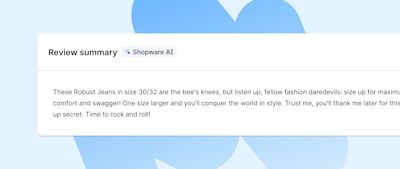
What would you say is the biggest bonus of the new feature?
Christian: This feature lets merchants create a summary of reviews, which can help their customers make up their minds to buy. The summary of all the saved reviews quickly provides customers – and also merchants – with a better idea of the overall response to a product so far.
That’s handy for the customers and for the merchants. Thanks for the explanation, Christian!
Feature 6: Custom checkout message

Martin, can you sum this feature up for us in one sentence?
Martin: No problem. With the AI Copilot | custom checkout message, you can send your customers a customized AI-generated message after purchase based on their cart, and this personal approach helps increase customer loyalty.
And how does the feature work?
Martin: Once an order is placed, artificial intelligence automatically generates a personalized message for the customer. This message is based on settings you can make in the admin, for example specifying length and language style. It’s primarily tailored to the products that the customer has just ordered. The message is displayed in the storefront once the order has been completed. Merchants can run detailed tests on the messages beforehand and try out the different settings before they activate them.
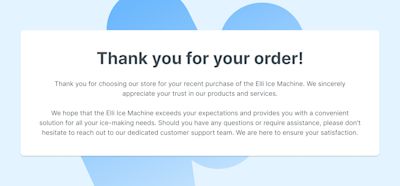
How do merchants benefit from this feature?
Martin: Sending a personalized message to the customer increases their identification with the purchased products or brands and strengthens their sense of loyalty – without any manual effort on the part of the merchant.
Thank you for the insights, Martin.
Feature 7: AI-generated product properties

Matthias, in a sentence – what can the new feature do?
Matthias: The AI Copilot | product properties suggests product properties on the basis of a product description.
And how does the feature work?
Matthias: Based on the product description, the feature can automatically create a list of properties for the product. It also recognizes which properties are already saved, so that you can instantly see which properties are new and which aren’t.
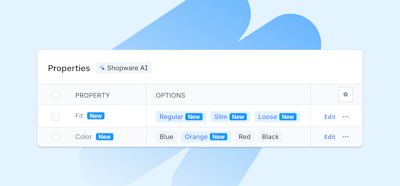
How do merchants benefit from this feature?
Matthias: Updating properties is often repetitive, monotonous, and time-consuming day-to-day work – but it’s extremely important if you want to offer customers additional filter options in the storefront or even create variants. The new feature saves merchants a lot of time as it automatically provides suggestions.
Many thanks, Matthias!
Feature 8: AI-based translation for reviews

Marcel, please sum up the new feature in a sentence.
Marcel: With the AI Copilot | translation for reviews, product reviews can be translated using AI so that customers have a quick and easy way of understanding international reviews.
And how does that work in detail?
Marcel: Once you’ve activated the feature in the settings, customers can have individual reviews in the storefront automatically translated by artificial intelligence so that they can get a better picture of the product.
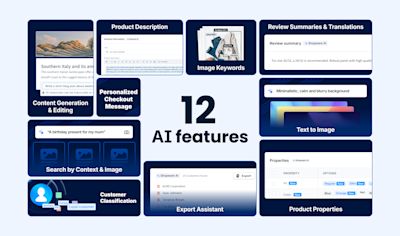
What do you see as the biggest bonus?
Marcel: The more reviews customers can read and understand, the better their idea of the product will be. In the long term, this will also result in better product reviews (as expectations are realistic from the outset) and will minimize the returns quota too.
Great. Thanks, Marcel!
Feature 9: AI-generated product descriptions
This feature is not new, as it is the very first AI-driven feature we have released. In the blog post Shopware and AI – our new AI feature for your business, we have already presented this feature in detail. Merchants can have product descriptions created with the help of AI. As a basis, it is enough to enter a few key pieces of information. The formulated product description can then be taken over directly or adapted again.
Feature 10: Search by context

Julia, can you summarize the feature in one sentence?
Julia: With AI Copilot | search by context, shoppers can use everyday language to search for products.
How does it work exactly?
Julia: For example, they can enter "I'm planning a trip to New York". Depending on the sales channel and context, our AI-powered search function will suggest relevant products that lead to cross-selling results.

To what extent does this represent added value for merchants?
Julia: Primarily designed with the merchant's customers in mind, this feature indirectly enriches the retailer's toolkit. By leveraging context-driven searches, merchants can provide an innovative user experience, and through strategic cross-selling, they're positioned to boost their sales.
Thank you very much, Julia!
Feature 11: Search by image

Hi Aaron, could you describe the feature in one sentence?
Aaron: The image-based search simplifies the process for online shoppers to find their desired product by simply uploading a photo of it.
Could you please explain how exactly it works?
Aaron: Customers can upload a photo in the online shop – let’s take, for example, a red bag that caught their eye. Our artificial intelligence analyzes this image and translates it into search terms based on the shop's context. These terms then serve as the basis for the search to find matching results.
The AI conducts a very detailed analysis, so that, for instance, in a fashion store, it takes into account patterns, materials, and style, ensuring that the search delivers the most accurate results.
Another advantage of this search method: The artificial intelligence also understands the context of the image. Visitors of an online bicycle shop, for example, can upload a photo of a flat bicycle tire and receive not just bicycle tubes as search results, but also the necessary tools for repairing the tire.

And how do merchants benefit from this?
Aaron: Merchants benefit greatly, as they can offer their customers an innovative and user-friendly way of product searching. This not only increases the likelihood that customers will find exactly what they are looking for but also improves the overall user experience. A positive shopping experience increases the chance that customers will want to return and shop again in their online store.
Thank you for the insights, Aaron!
Feature 12: Text zu Bild

Hello again, Julia, could you also describe this feature for us in one sentence?
Julia: Text to Image generates an appealing visualization based on your description, which you can use for your product displays.
How exactly does it work?
Julia: You write a text, for example, "minimalist design fashion store." The artificial intelligence then creates a matching background that you can use directly in the Shopware Shopping Experiences.
Why is this a big advantage for online merchants?
Julia: In just a few seconds, you can create a new background image for your products, placing them in an entirely new context. For instance, you can adapt the background to seasonal occasions, create different moods, or test new backgrounds to see which works best.
Awesome, thank you, Julia!
How can you use the Shopware AI Copilot?
All of the AI-powered features presented here are part of Shopware’s AI Copilot, available in Shopware version 6.5.1.0 and higher. It’s included in all commercial Shopware plans – ready to enhance your ecommerce experience!
Not using Shopware yet?
Discover how Shopware can help you optimize and grow your online business. Let’s get started!










